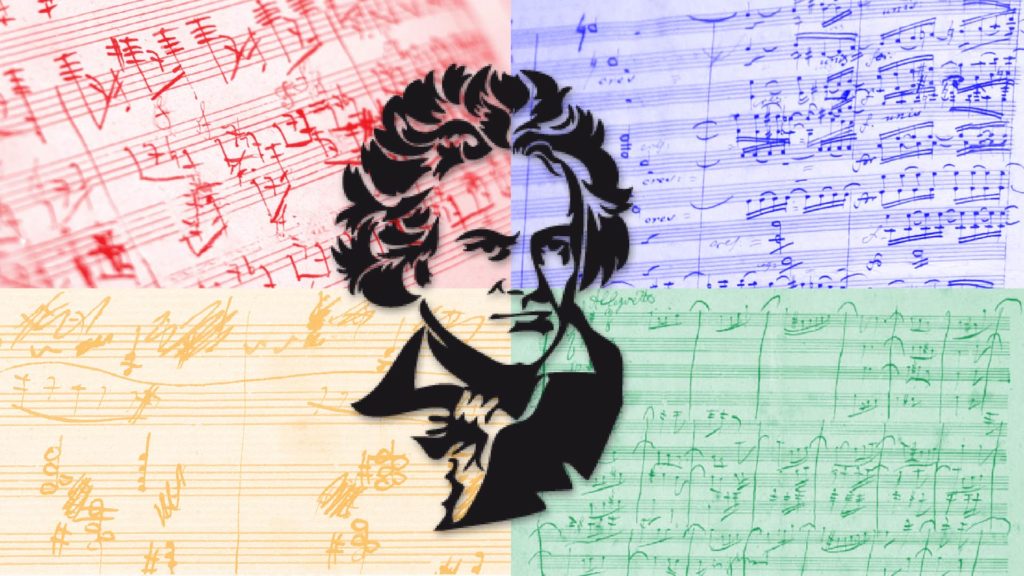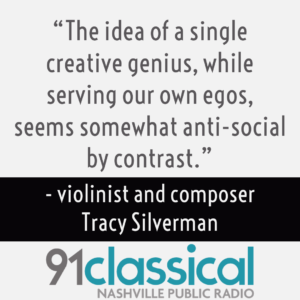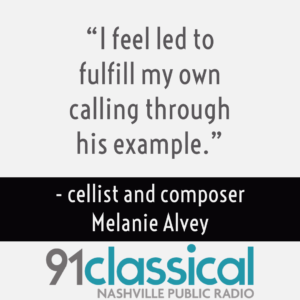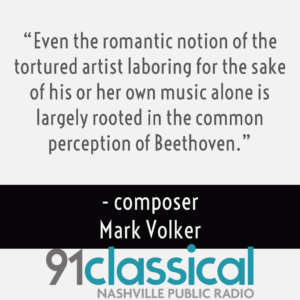
In a 2017 interview in Rolling Stone Magazine, songwriter Billy Joel cited the lasting influence of classical music on his work – specifically the music of Beethoven. He pointed out that Neil Diamond had once said, “I have forgiven myself for not being Beethoven.” And this set off a realization for Joel: “I realized my issue was I haven’t forgiven myself for not being Beethoven.”
Joel is in good company. Johannes Brahms faced constant comparison with Beethoven, saying, “You don’t know what it means to the likes of us when we hear his footsteps behind us.” After Robert Schumann had proclaimed the young Brahms to be the successor of Beethoven’s legacy, Brahms was not amused to hear his first symphony referred to as “Beethoven’s Tenth.”
Meanwhile, some composers enjoy tipping their cap to good old Beethoven. Christopher Rouse’s Symphony No. 5 begins with a “shout-out,” as Rouse called it, to Beethoven’s Fifth, with the same “fate” rhythm – short-short-short-long. Nashville’s own Cristina Spinei, who studied with Rouse, gives Beethoven a nod in a piece of her own, titled If Beethoven Danced Merengue.
And whether deliberate or not, Beethoven is one of the most quotable composers in history. In fact, this was proven by a scientific study, in which piano music through history was studied mathematically for novel structures, and for mimicry and imitation later on. While Rachmaninoff took the lead on novelty, Beethoven had the highest score of influence/imitation – outshining even Mozart and Haydn.
Even beyond his domination of programming, the musical influence of Beethoven looms large, whether today’s composers are comfortable with it or not. We asked local composers for their thoughts on Beethoven’s musical legacy, and how it has affected their work.
Violinist Tracy Silverman has found the composer to be increasingly problematic, taking more joy in listening to Beethoven’s works than playing them.
“It was assumed that we all considered Beethoven to be one of the greatest musical geniuses of all time. It had to do not only with his technical innovations and mastery of harmony and form, but of his sense of the musician as creator of art rather than as artisan. In this way, he was a thought leader of the Romantic era.
“And here is where I found a difficult schism in my own thinking. On the one hand, Beethoven represented the self-aggrandizing notion of music as art — the idea that we musicians are creating not just something for an occasion or even for repeated enjoyment, but something much more important — a work of musical art which says something much more significant about the human condition beyond the surface value of pleasant melodies and harmonies. Something created not for the near future but for eternity. This was a somewhat new perspective which was a product of the Romantic era, but while so attractive to all of us in the world of music, the ascendence of the single genius artist/creator is actually an anomaly in the history of music.
“For the most part, in most cultures of the world, music was generally created in a more communal way, largely improvised by groups of people as a way to join together with other people for the sake of a ritual of some kind. The idea of the single creative genius, while serving our own egos, seems somewhat anti-social by contrast. The more involved I became with improvised music in jazz, rock, the music of India and elsewhere, I came to understand that perhaps Beethoven should not automatically be considered better than these more communal musicians, and should not automatically be seen as more highly evolved achievements of music. 
“This was the narrative I grew up with and which I struggled with for years: that Beethoven and the art music of Europe that he represents was the most evolved form of music yet created. That he elevated music to works of art rather than craft. That European art music was more highly structured, nuanced and technically advanced than other music. As I attempted to bridge the gap between the obvious artistic merit of Beethoven’s work and this rather narrow world view, I came down on the side of non-European musicians. The more I discovered the music of other cultures, the more respect I gained for it, and the more the genius of Beethoven became just another wonderful expression of a musical culture, in his case European, like so many other wonderful music cultures around the world and through history.”
Melanie Joy Alvey, who now composes and arranges for strings, retains a fondness for Beethoven, having started her experience with the composer through his chamber music. Plus, she finds inspiration in the composer’s perseverance through his health afflictions.
“In high school, I learned the Op. 18 and his “Spring Sonata.” His game of chase between the violin and piano in the third movement of Spring fascinated me. I was excited about learning the fast runs, but even more thrilled about working out my part with a friend. This experience gave me my first real taste of the joys of chamber music.
 “Later I discovered my compositional voice through the studies of his later quartets. My String Quintet No. 1: Scene Shifting is a blend of my love for jazz and commercial strings with compositional elements I learned from Beethoven. These elements include passing quick melodic lines between instruments, placing melodic notes on odd beats, not always landing on the tonic at the end of phrases, and using the full range of the scale for melodic content. I remember the first time I heard the startling contrast of moods within the first minute of his Grosse Fuge, and it opened me to new possibilities I hadn’t considered before.
“Later I discovered my compositional voice through the studies of his later quartets. My String Quintet No. 1: Scene Shifting is a blend of my love for jazz and commercial strings with compositional elements I learned from Beethoven. These elements include passing quick melodic lines between instruments, placing melodic notes on odd beats, not always landing on the tonic at the end of phrases, and using the full range of the scale for melodic content. I remember the first time I heard the startling contrast of moods within the first minute of his Grosse Fuge, and it opened me to new possibilities I hadn’t considered before.
In certain periods of my life when external factors prevented me from performing and composing, I thought back to Beethoven’s unbelievable perseverance through the most difficult of situations a musician can be in. I feel led to fulfill my own calling through his example.”
Belmont University faculty member Mark Volker acknowledges that the vast majority of music from throughout history – including recent history – goes unplayed after its premiere. And while he is disheartened by the complete dominance of one composer in all of orchestral programming, he acknowledges that Beethoven is something unique.
“Like most historic artists revered as titans, their relationship to modern culture is complex. Yet Beethoven occupies a unique place in western European art and culture, one that makes the saturation of orchestra programs with his music seem almost warranted.
“For instance, Bach’s and Mozart’s greatness lies largely in their status as the culmination of trends that led to them. Their influences are quite transparent. They simply did much better what their predecessors had already done. Their music was the result of an evolution in musical thinking, crystallized to a beautifully powerful point.
“This is true of Beethoven to some degree. But the bold innovations of his later music in harmony, musical development, and musical form were actual leaps forward in musical thinking, not just evolution.
“Even the romantic notion of the tortured artist laboring for the sake of his or her music alone is largely rooted in the common perception of Beethoven.
“Unlike most music, I find that the more I hear his, the more it resonates. Also, the more I have learned about him and his music, the more I appreciate it. Listen to his string quartet op. 131 or even the earlier Sixth Symphony, and it is difficult to find meaningful precedents for their balance of free-flowing expressiveness and clarity of structure. The way he develops rich musical lines from a simple rhythm and a single interval in his Third Symphony almost sounds modern – no flowing Mozartean melodies, but direct, expressive, reflexive musical gestures that sound almost conversational. The development sections of his sonatas often sound like jazz improvisations.
“I think many modern composers still idealize Beethoven because he represents the combination of craft, creativity and passion for which so many of us strive. I have never explicitly “tipped my cap” to him in my music. But anytime we seek to develop as much from a short musical idea as possible, we are wise to consider the examples of Beethoven.”
We’re continuing to explore the lasting influence of Ludwig Van Beethoven as the world celebrates the composer’s 250th birthday this year. Find all of our related content in the Beethoven250 archive.